Feb 22, 2026
Feb 22, 2026
by H.N. Bali
In 2008, most observers of the global financial crisis blamed what happened on just a few greedy bankers who took unconscionably irrational risks and forced the rest of us to foot the bill. However, perceptive analysts of the system like Raghuram Rajan, one of world’s most distinguished economist and currently the Chief Economic Adviser to the Government of India, struck a different note.
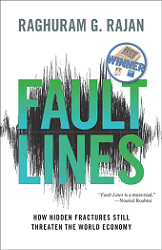 Rajan, for instance, argued that serious flaws in the economy are also responsible for what happened, and warned that a potentially more devastating crisis awaits us should we fail to rectify these flaws. He called such flaws as Fault Lines, which is also the title of his highly acclaimed book on the same theme. In Fault Lines, Rajan argues how the individual choices made by individuals collectively led to the economic meltdown were, as a matter of fact, rational responses to a flawed global financial order.
Rajan, for instance, argued that serious flaws in the economy are also responsible for what happened, and warned that a potentially more devastating crisis awaits us should we fail to rectify these flaws. He called such flaws as Fault Lines, which is also the title of his highly acclaimed book on the same theme. In Fault Lines, Rajan argues how the individual choices made by individuals collectively led to the economic meltdown were, as a matter of fact, rational responses to a flawed global financial order.
Come to think of it, there are indeed in every system and society fault lines hidden from public view that work as destabilizing forces. Interestingly enough, the term fault lines is originally derived from geology, representing cracks in the earth's crust resulting from the tectonic shifts. These fault lines are responsible for natural catastrophes called earthquakes.
Hence, there’s emphasis in every society to put in place institutions to provide it certain degree of cohesiveness and stability. This is exacting the wise men after Independence (generally referred to as the Founding Fathers of our Constitution) emphasized. They provided, within the constitutional framework, interlocking key institutions representing legislative, executive and judicial branches of the polity. These were further supported by social institutions already around. It is a matter of profound regret that we allowed this intricate institutional net-work to atrophy over a period of time.
Defining Rules of the Game
“Institutions are,” as the American Economics Nobel Laureate Douglass North emphasized, “the rules of the game in a society or, more formally, are the humanly devised constraints that shape human interaction”. He highlighted the key implications of institutions. “In consequence they structure incentives in human exchange, whether political, social, or economic”. Institutions comprise, for example, contracts and contract enforcement, protection of property rights, the rule of law, government bureaucracies, financial markets, et al.
They also include habits and beliefs, norms, social cleavages and traditions in education. These constitute informal institutions. Formal institutions typically tend to be the crystallization of informal institutions.
Perhaps the most important of the institutions is the invisible Grand Contract that holds a society together. The adhesive force is the search for common good – succinctly put in the Buddhist tenet:
Bahujana hitaya, bahujana sukhaya
For the benefit of many, for the happiness of many
Contribution of Individuals
Often do institutions in their development and growth owe enormously to the dedication of certain individuals who leave a distinct imprint of their personalities on institutional templates! Their efforts at guiding and shaping institutions leave behind a road map for the next generation to chart the course. However, the inherent strength of institution is the self-propelled momentum given by the ideals that constitute their foundations.
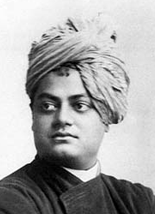 Let me illustrate this by two examples. Ramkrishna Math and Ramakrishna Mission were founded by Ramakrishna’s St. Paul, Swami Vivekananda, on May 1, 1897 on his return from America. The Mission conducts extensive work in fields like health care, disaster relief, rural management, tribal welfare, elementary and higher education and propagation of Vedantic culture. Its main functionaries are hundreds of ordained monks of the order assisted by thousands of householder disciples who put in extensive voluntary work.
Let me illustrate this by two examples. Ramkrishna Math and Ramakrishna Mission were founded by Ramakrishna’s St. Paul, Swami Vivekananda, on May 1, 1897 on his return from America. The Mission conducts extensive work in fields like health care, disaster relief, rural management, tribal welfare, elementary and higher education and propagation of Vedantic culture. Its main functionaries are hundreds of ordained monks of the order assisted by thousands of householder disciples who put in extensive voluntary work.
The aims and objectives of the Mission are purely spiritual and humanitarian. They have nothing whatsoever to do with politics. Vivekananda had set “Renunciation and Service” as the twofold national ideals of modern India, and all the work of Ramakrishna Mission is guided by these ideals. The service activities are guided by the Vedantic message: “Jiva is Shiva” – what Ramakrishna had preached that service to man is service to God.
The Motto that the organization has as its lodestar is Atmano Mokshartham Jagad-hitaya Cha: i.e., (Live life) for one's own salvation, and for the good of the world.
A great deal of the credit for the great work of Ramkrishna Math and Ramakrishna Mission goes to Vivekananda’s great vision and selfless dedication. He measures fully and squarely the acid test of leadership that Walter Lippman prescribed: “The final test of a leader is that he leaves behind in others the conviction and will to carry on.”
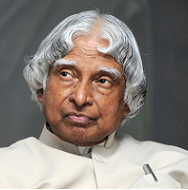 My second example is from purely secular area, and it indeed does India proud. It is the work of Defense Research and Development Organization (DRDO) and Indian Space Research Organization (ISRO) – areas that India had to struggle independently to develop and nurture without any help from the super powers. And the one person whose contribution is most noteworthy is Dr. A.P.J. Abdul Kalam, popularly known as the Missile Man of India whose work on the development of ballistic missile and launch vehicle technology has gained international recognition. A grateful nation elected him the President of India in 2002 in recognition of the selfless dedication to make India independent in a strategically vital area.
My second example is from purely secular area, and it indeed does India proud. It is the work of Defense Research and Development Organization (DRDO) and Indian Space Research Organization (ISRO) – areas that India had to struggle independently to develop and nurture without any help from the super powers. And the one person whose contribution is most noteworthy is Dr. A.P.J. Abdul Kalam, popularly known as the Missile Man of India whose work on the development of ballistic missile and launch vehicle technology has gained international recognition. A grateful nation elected him the President of India in 2002 in recognition of the selfless dedication to make India independent in a strategically vital area.
If individuals play great roles in developing organizations they also can be responsible for the downfall – and even disintegration – of institutions. This is largely on account of the struggle for power and control at the helm of affairs.
Take the example of Indira Gandhi who in her bid to eliminate her political rivals within the top echelons of the Indian National Congress converted a great political organization into a family fief, which over a period of time has spawned into a political jagirdari system all over the country from Abdullah dynasty in Kashmir to Karunanidhi clan up to Kanyakumari.
Institutions Play Important Role in All Spheres
The idea that the prosperity of a society depends on its economic institutions goes back at least to Adam Smith. What great crucial role do institutions play in the growth and development of a country could perhaps be best documented by the Korean experiment.
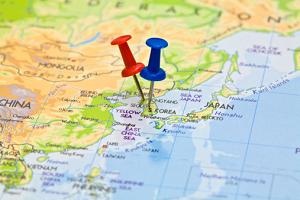 Till 1945, Korea was under Japanese occupation. Its independence came shortly after the Japanese announced their surrender on August 15, 1945. Immediately thereafter, Soviet forces entered Manchuria and North Korea and took over the control of these provinces from the Japanese. The major concern of the United States was to prevent the takeover of the entire Korean peninsula either by the Soviet Union or by communist forces under Kim II Sung. Americans, accordingly, threw their military weight behind that influential nationalist leader Syngman Rhee, who was in favor of separation rather than a united communist Korea. Elections in the South were held in May 1948, amidst a widespread boycott by Koreans opposed to separation.
Till 1945, Korea was under Japanese occupation. Its independence came shortly after the Japanese announced their surrender on August 15, 1945. Immediately thereafter, Soviet forces entered Manchuria and North Korea and took over the control of these provinces from the Japanese. The major concern of the United States was to prevent the takeover of the entire Korean peninsula either by the Soviet Union or by communist forces under Kim II Sung. Americans, accordingly, threw their military weight behind that influential nationalist leader Syngman Rhee, who was in favor of separation rather than a united communist Korea. Elections in the South were held in May 1948, amidst a widespread boycott by Koreans opposed to separation.
The newly elected representatives proceeded to draft a new constitution and established the Republic of Korea to the south of the 38th parallel. The North became the Democratic People's Republic of Korea, under the control of Kim II Sung.
These two independent countries organized themselves in very different ways and adopted completely different sets of institutions – both economic and political. The North followed the Soviet and Chinese models. Institutions based on private property of land and capital were abolished. Economic decisions were no longer to be mediated by the market, but by the State. The South, on the contrary, maintained a system of private property and the government and attempted to use markets and private incentives to develop the economy.
Before this “natural experiment” in institutional change, North and South Korea shared the same history and cultural roots. In fact, Korea exhibited an unparalleled degree of ethnic, linguistic, cultural, and economic homogeneity. There are few geographic distinctions between the North and South. In terms of natural resources North Korea was better endowed with significant reserves of coal, lead, tungsten, zinc, graphite, magnetite, iron ore, copper, gold, and above all, hydropower. South Korea's natural resources are coal and other metals besides hydropower potential. Both countries share very similar geographic possibilities in terms of access to markets and the cost of transportation.
Other man-made initial economic conditions, in fact, favored the North. For example, there was significant industrialization during the colonial period with the expansion of both Japanese and indigenous firms.
By the late 1960’s South Korea was transformed into one of the Asian “miracle” economies, experiencing one of the most rapid surges of economic prosperity in history while North Korea stagnated. By 2000 the level of income in South Korea was $16,100 while in North Korea it was measly $1,000. By 2000 the South had become a member of the Organization of Economic Cooperation and Development, the rich nations club, while the North had a level of per-capita income about the same as a typical sub-Saharan African country.
There is only one plausible explanation for the radically different economic experiences on the two Koreas after 1950: their very different institutions led to divergent economic outcomes. Let us not forget that the two Koreas not only shared the same geography, but also the same culture.
Debasing Institutions
Perhaps the most grievous body blow to our polity – and that too entirely self-inflicted – is how, over the years, we debased and deformed the institutions that we inherited and at the same time allowed to corrode whatever institutions we built in the first flush of freedom. It was Vivekananda who for the first time highlighted our lack of attention to organization-building. May I add we’re appallingly poor at countering disruptive influences that erode whatever institutional frame-work has been built over time.
In fact, this has been a fatal weakness of Hindu civilization notwithstanding its other glorious achievements. Partially, it was rectified by Buddhism, which understood the importance of creating the organization like Sangha. An organized Church was, for instance, a great strength of Christianity in sustaining and nurturing Western civilization.
Organizations are created to achieve goals transcending individual interests by addressing collective effort yoked to a tangible vision through dedicated leadership and strategy, backed up by unflagging morale. These, in turn, have played a key role in socio-economic transformation as much as in administration of existing institutions.
In our long, chequered history we paid a formidable price for our failure to build and nurture institutions and the traits that sustain them. It wasn't after all just the superior cannon power that helped the British to build their empire in India. More importantly, organizational skills, morale and, above all, strategy carried the day. And this happened not once but repeatedly. The better-led Bengal Army was – let's not forget – the sword arm of the British power in India. The defeat of the Sikh forces in the Sikh Wars was entirely on account of poor leadership. In Srirangapatnam, for instance, it was the superior organizational skills of the
British in terms of strategy that led to Tipu's defeat in 1799.
Cussed indifference to organization-building has been the Achilles heel of Indian rulers.
Whatever their real intentions, the British played a very significant role in creating some vitally important organizations during their two-hundred-year rule in India. These were: the Indian Army to defend the country and maintain its territorial integrity; legislative bodies at regional and central levels for law making, a permanent civil service to run the country's administration; and a judicial system to enforce the rule of law.
What have we done since Independence to use, preserve and further consolidate these institutions? Regrettably, our record doesn't cover us with glory.
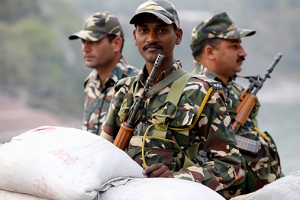 Take, first, the Indian Army. Almost everything possible has been done to lower the morale of the services by most uncalled-for political interference in matters of postings and promotions – matters that should be entirely left to the painstakingly crafted policy-frame which otherwise vitally impacts morale. Each political intervention in these matters erodes the credibility of the system on which rests the foundation of morale – that all-too-important attribute of the armed forces. Repeated intrusions in the working of the system by the likes of V K Krishna Menon and Gen B N Kaul undermined the sound foundations on which the system had been built and repeated tinkering with it has only tended to damage it irreparably. Imagine the impact on morale of the still-unresolved issue –unresolved after a decade of debate and discussion – of one rank, one pension.
Take, first, the Indian Army. Almost everything possible has been done to lower the morale of the services by most uncalled-for political interference in matters of postings and promotions – matters that should be entirely left to the painstakingly crafted policy-frame which otherwise vitally impacts morale. Each political intervention in these matters erodes the credibility of the system on which rests the foundation of morale – that all-too-important attribute of the armed forces. Repeated intrusions in the working of the system by the likes of V K Krishna Menon and Gen B N Kaul undermined the sound foundations on which the system had been built and repeated tinkering with it has only tended to damage it irreparably. Imagine the impact on morale of the still-unresolved issue –unresolved after a decade of debate and discussion – of one rank, one pension.
The harm done to the administrative services has been worse. Over the years, the Congress Party took every possible step to politicize the bureaucracy to achieve short-term political ends. The governing party under Indira Gandhi for instance sought to create a committed bureaucracy expected to do whatever the Government of the day wished irrespective of its intrinsic merit. This led to the administrative services ceasing to be the instruments of policy implementation and becoming, instead, pawns on the political chessboard.
The slow-moving judicial system was almost allowed to atrophy. Never was a serious attempt made in the last fifty years to make judiciary accountable or learn to travel at a speed faster than the proverbial snail.
However regrettable the above developments at the macro level; the degradation in our society of the institutional infrastructure at the micro level is heartrending indeed. Each organization is created to serve certain stakeholders some of whom are internal (like its employees and shareholders) while others (its customers, for instance) are external. The latter, of course, are far more important because an organization's future depends on serving them effectively. Most of the organizations created for the specific purpose of serving the society – our municipal bodies or the PSUs for instance – have, over the years, become instruments of serving only the interests of their internal stakeholders. For our trade unions the interests of the workers are far more important than the long-term future of the organization or the satisfaction of their customers. Similarly, our municipal bodies seem to be concerned only with the jobs and prospects of their employees rather than providing the services for which they were created. What we have done in our society to belittle the raison d’etre of institutions is unparalleled in the history of organizational theory and practice. In Western society, which excels in organization-building, diagnostic tools have been devised to ensure timely intervention to give an organization a new lease of life before the stage of inevitable decline sets in. By caring exclusively for their internal stakeholders we ensure that the stage of organizational atrophy sets in prematurely and organizations assume comatose status during the growth stage itself.
Consequently, we are saddled with a notoriously unresponsive multi-layered bureaucracy whose concerns scarcely go beyond the three p's that matter the most to it, namely, pay, perks and promotion. Every bureaucrat is concerned with his carry-home, time-bound promotion to the next higher level with least concern with discharge of his duties as a public functionary.
Over the years, our politicians have spared no effort to tinker with the time-tested command structure of our armed forces through repeated interference that dented their morale. India is the only democratic polity in the world where defense forces are not a part of the defense-related national policy-making. That is on account of a latent fear that the Governments of the day from Jawaharlal onwards had that something similar to what happens fairly frequently in our neighborhood, might not occur here as well.
We have a thoroughly dehumanized police force which has its fingers in almost all pies baked in the world of crime. Torture and violence is widespread in India and is a routine strategy of police control. It includes custodial violence, physical and mental abuse, rape, threats, humiliations, and deprivations of food and water and medicines. Torture occurs because it is met with acquiescence by the superior officers. Citizens are usually powerless to report on torture. The police are reluctant to investigate, and when they need to explain why the person died or was injured, they often say that he committed suicide when in custody or they cite an “encounter”, meaning that the person either fled or resisted the arrest, which brought about the use of force.
Naturally, as with all cases of police misconduct, the ones most affected are poor and socially marginalized who lack the political clout to affect police procedures. Citizens feel insecure and helpless against such repressive measures. Moreover, the complicity of police officers makes filing a complaint impractical. Who would investigate it? Who would press the charges? Who would prosecute the offenders and bring them to justice?
We have politicians who look upon their elected offices as seats of power and influence to be used as unscrupulously as possible. The way our elected representatives conduct themselves in our Central and State legislatures is often disgusting. At times, it is worse than a street brawl. And you and I pay some eight thousand rupees per minute for enacting this ludicrous farce in Parliament.
In the next few essays I propose to examine in some detail how all of leading institutions have, one after another, been debased and how possibly, can they be revived unless we choose to live with a failed State.
Next: Egregious Historical Blunder
27-Jan-2013
More by : H.N. Bali

|
It is very apparent that not only we are not organization builders, we are apt in destroying any organizations handed over to us. We are blessed with sharp intellect, yet apply all of it for totally selfish reasons for immediate self- gratification at the cost of everything else. We cannot even see that it will hurt us eventually. It is in our selfish interest to protect and nurture these institutions. It is almost like a divine curse upon us to be so gifted with such an intellect and then be void of applying it to build our organizational institutions for common good. We cannot even see the rest of the world and learn from them. Indian intellectuals in foreign countries shine and rise for their individual efforts in their adopted foreign organizational setup. Yet when we return “home” we toss out everything we have learned and join the mob here. It is so disheartening! Thank you for driving the point home. |